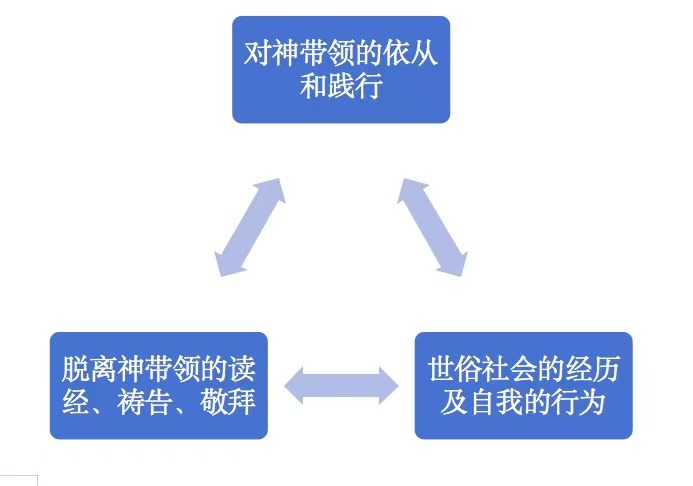耶稣回答说:“第一要紧的,就是说:‘以色列啊,你要听,主我们神,是独一的主。你要尽心、尽性、尽意、尽力爱主你的神。’其次就是说:‘要爱人如己。’再没有比这两条诫命更大的了。”(马可福音12:29-31 和合本)
作为信主多年的基督徒,我们耳熟能详这段经文,且很多弟兄姐妹在生活中努力践行“爱神爱人”。然而,很多人在尽力行善和追求圣洁的过程中仍会感到力不从心,尤其随着生活的变化和岁月的流逝,信徒们难免遭遇不如意的事情。这时,怨言和疑惑悄然而生:“我如此努力依靠神,为什么祂不赐我平安顺遂的生活?为什么祂不除去我的疾病和患难?”这种迷茫,让许多人在信仰的道路上感到无助,甚至逐渐失去起初那份火热的追求。

一、迷茫中的怨言:生病、患难和对神的困惑
我们身边很多基督徒希望通过虔诚的祷告、聚会敬拜和行善来赢得神的祝福,期盼神会回报他们顺遂的生活。然而,当他们面对疾病、家庭失和、经济困境,甚至社会的不公时,挫败感和失望随之而来:
- 生病的痛苦:小S是一位虔诚的基督徒,但因长期慢性病和身体虚弱而生活不便。他勤勉读经、参加教会活动,时常祈求神的医治。然而,年复一年,他的健康状况并未改善。他疑惑地问自己:“我那么敬虔,神为什么不医治我?是我不够虔诚,还是我的祷告没有触动祂的心?”
- 家庭的患难:I女士的家庭生活不尽人意,丈夫冷漠不开启心扉,子女也似乎远离信仰。尽管她每日虔诚地为家人祷告,求神带来平安与和睦,但家庭关系依旧紧张。她不禁疑惑:“我如此爱主,也为家人尽心祷告,为什么神不改变我的家人?”
- 事业上的坎坷:N先生是认真工作的基督徒,看似兢兢业业,却总难以晋升,收入勉强养家。他忍不住抱怨:“我如此努力,神为什么不赐我好运,让我的生活轻松些?”
这些疑惑和怨言在信徒中并不少见。信徒们期望虔诚的付出能换来神的祝福,但现实却常常不尽如人意,导致他们对信仰的真谛产生动摇。
可是弟兄姐妹们想过没有,S、I和N这几位基督徒的疑问并非出自对神的依从,而是基于一种对自我掌控的渴望-----希望自己的虔诚能换来生活的顺利,而不愿意面对神允许的试炼。这些情绪反映了“心灵管道”中的自我成为了堵塞,神的爱难以顺畅地流通。

二、约伯的榜样:病痛与患难的另一种视角
面对这样的困惑,我们可以从《约伯记》中得到深刻启示。约伯是一位完全正直、敬畏神的义人(地上再没有人像他完全正直,敬畏 神,远离恶事。”(约伯记 1:8b 和合本)),然而他经历了失去家产、子女和健康的极端痛苦。朋友们怀疑他是否得罪了神,导致了苦难,但约伯清楚这并非因为他的错误。就约伯的故事而言,病痛与患难不总是因人的无能或过失,反而常常是更深层次的信仰考验,使我们更深入地认识神。
约伯的经历并非由于他不够虔诚,恰恰相反,正是因为他在神眼中为义人,才被撒但试探。神的旨意远超人的理解,我们用有限的眼光,往往会误解苦难为神的疏忽或惩罚,但实际上这种论断本身就已经跨越了对神旨意的顺服,而不是欢心接受神对每一个信徒的独特计划。实际上,许多苦难的降临不是神要惩罚我们,而是要加深我们对祂的大能与慈爱的认识。通过苦难,神让我们经历从未体会的深度,引导我们与祂的关系更为密切。
值得一提的是,作为罪人,我们大概率不像约伯那样‘完全正直、敬畏神’。我们心灵管道的自我成分恐怕早已被显在和隐藏的罪堵塞,这些罪如同体内血管中过剩的脂肪,成为阻碍着神的爱流通。
三、认识神:清洁心灵的根本之道
约伯和我们不同,他最终在痛苦的试炼中与神有了直接的对话。他从前对神的认识只是耳闻,而经历痛苦后,才真正“现在亲眼看见你”(约伯记42:5b)。然而,确切的讲,‘很多病患和困难并非源于人的过错’这句话,对约伯及信靠神的那类人而言是因为对神的认识不够深入,而作为‘罪人’的大多数人则不应轻轻松松地把自己划到约伯的队列而忽略了自身罪的悔改。就是说,当我们遇到生病、家庭不和、事业坎坷等问题时,更应以悔改的心态去清洁我们的心灵管道,就像文章开始部分举例的那几位基督徒S、I和N,不能只是对神抱怨不满,要悔改并积极融入神预备的环境中。

在生病和患难中,我们若能真正“看见”神,就会发现这些经历正是与神关系深入的机会。祂并非冷漠地旁观我们的痛苦,而是透过苦难与我们同行,帮助我们成长,提醒我们顺服祂的带领并以壮士断腕的勇气加以悔改。清洁心灵的目的在于更加深入地认识神、信靠祂的主权,让神的爱毫无阻碍地流通在我们的生命中。这种自由自在的生活状态是被造物对造物主最彻底的荣耀方式。
四、在悔改中成为爱的管道
刚才提到了,要成为神爱的流通管道,首先需要悔改并清洁我们的内心。只有当我们心灵中的怨言、迷茫、对神的误解都被清除,才能让神的爱通过我们流向他人。悔改并不是羞辱,而是承认我们的软弱,允许神进入我们的心,去除那些阻碍爱的杂质。正如约伯在痛苦中见证了神的真实,基督徒也可以在悔改中获得更深的属灵成长,成为爱的器皿。
尤其是遇到患难后更紧迫的不是按自己当前的需要求神干这、干那,先思考自己的心灵管道是不是被罪的脂肪给堵塞了,哪些地方需要悔改,从这些方面入手的祷告才是顺服的祷告,不应对神的‘作为’指手画脚,清洁之后的心灵管道自然会容下神给予的任何结果,这时候才是和约伯的经历做比较的时刻,S、I和N几位基督徒或许在顺服神和践行自由生活方面须进一步体会放下自我的意义。
我们可能无法理解每一个苦难的意义,但信仰路上的每一个患难都在帮助我们清洁心灵管道,使我们学会依靠神的力量。生活中的苦难不是神的惩罚,而是祂以另一种方式对我们的爱,带领我们在顺境之外的景况中学会信任与顺服。大到疾病和患难,小到家里的琐事处处折射出神带领的影子和轨迹。
困难像是一面镜子,提醒我们悔改、顺服,让我们的心重新回到神的轨道上,成为我们认识神的起点。在经历困难的过程中,既要悔改,求得神的带领和安慰,同时也应承担长久以来不顺服产生的相应后果-----这正是神在我们生命中的工作和爱意的另一种表达,是我们应该补上的功课:基督的确赦免了我们的过犯,但我们也要赦免自己、钉死老我并回转向神。
当我们从怨言中悔改,清洁心灵管道,神的爱便会在我们生命中自然流通。这种爱并不限于顺境中的平安,而是超越环境的喜乐。“耶稣说:‘我实在告诉你们:你们若不回转,变成小孩子的样式,断不得进天国。’”(马太福音18:3 和合本)这里的小孩子不再是那个被撒但诱惑前亚当的懵懂样子,而是那些具备各样的知识和神的智慧却愿意放下自我情绪和对神安排的抵触,以积极的心去服侍他人、践行主爱,甘愿成为世上的光和盐。约伯的故事也表明,真正的祝福不是摆脱一切痛苦,而是在痛苦中放下内心妄念,信靠神,行出祂的爱。

祝福语:让神的爱流通,活出信仰的自由
许多信徒的怨言和困惑,源于对神的不完全认识,包括我自己。学习,但要警惕的是不要被网上只言片语的零散“金句”所感动,更不能刻舟求剑式的解读经文,每个人在神的眼里都有特别的计划和安排,让我们用一颗积极追求的心面对神所预备的环境,理解神的计划。
清洁心灵管道,不仅是交托怨言,更是在信仰中寻求更深的视野,让神的爱透过我们流向他人。愿我们在悔改和信靠中成为神爱的管道,让祂的爱在我们的生命中流通,为这个世界带去光与希望。
请弟兄姐妹们一起为此祷告!
如有问题请联系[email protected]。
For Whom Is the Conduit of the Heart Laid?
“Jesus answered him, “The first of all the commandments is: ‘Hear, O Israel, the Lord our God, the Lord is one. And you shall love the Lord your God with all your heart, with all your soul, with all your mind, and with all your strength.’ This is the first commandment.”
(Mark 12:29–31, NKJV)
As Christians who have believed in the Lord for many years, we are all very familiar with this passage—and many of us strive daily to live out the call to love God and love others. Yet, despite our earnest efforts to do good and pursue holiness, we sometimes find ourselves overwhelmed, especially as life changes and the years pass by. In such moments, complaints and doubts quietly arise: “I have tried so hard to depend on God; why does He not grant me a peaceful and smooth life? Why does He not remove my illness and suffering?” These feelings of confusion leave many on the path of faith feeling helpless, gradually losing the fervor they once had.

I. Complaints in the Midst of Confusion: Illness, Suffering, and Questions About God
Many Christians around us hope that through sincere prayer, worship, and acts of goodness they will win God’s blessings and see a life marked by ease. However, when confronted with illnesses, family strife, economic hardships, and even societal injustice, feelings of frustration and disappointment soon follow. For example:
- The Pain of Illness: Consider “S,” a devout believer who, despite diligently reading Scripture, participating in church activities, and praying for healing, finds no lasting improvement in his chronic illness and frail health. In his heart, he wonders, “I have been so devout—why does God not heal me? Is it that I am not pious enough, or that my prayers have not touched Him?”
- Family Suffering: “I,” a woman whose family life is marred by her husband’s emotional coldness and whose children seem distanced from the faith, prays every day for peace and harmony at home. Still, the tension remains, prompting her to question, “I love the Lord so much and pray for my family with all my heart—why doesn’t God bring change to my family?”
- Career Setbacks: “N,” a hardworking Christian struggling in his career with little promotion and barely enough income to support his family, cannot help but complain, “I work so diligently—why does God not grant me some good fortune to make my life easier?”
These doubts and complaints are not uncommon among believers. Many expect that their devoted efforts will automatically yield God’s blessings; when reality falls short, their understanding of the true essence of faith begins to waver.
But have you ever considered that the questions raised by S, I, and N stem not from a lack of obedience to God but rather from a desire to control their own lives—hoping that their piety will secure an effortlessly smooth life? In these hearts, the “conduit of the spirit” has become blocked by self-centeredness, making it difficult for God’s love to flow freely.

II. The Example of Job: Another Perspective on Suffering
In the midst of these doubts, we can draw deep insight from the Book of Job. Job was a man who was completely righteous, who revered God and “avoided evil” (Job 1:8b, paraphrased). Yet he suffered the loss of his property, children, and health in extremis. Some of his friends wondered if his suffering was a result of sin, but Job understood that his trials were not born of his wrongdoing. His story teaches us that illness and adversity are not always the result of human shortcomings; rather, they can serve as profound tests of faith that lead us to a deeper understanding of God.
It is important to note that, as sinners, most of us do not live up to Job’s standard of complete righteousness. In many cases our inner “conduit” is already clogged by both visible and hidden sin—as though excess fat blocks the blood vessels—preventing God’s love from circulating freely.
III. Knowing God: The Fundamental Path to Cleansing the Heart
Unlike us, Job eventually had a direct encounter with God in the midst of his suffering, coming to see Him with his own eyes (“But now my eye sees You.”) (Job 42:5b NKJV). However, it must be recognized that while many pains and hardships do not result from our errors, our limited understanding of God’s nature may lead us to misinterpret our trials as neglect or punishment, rather than as opportunities for deeper reliance on Him. When we face illnesses, family discord, or career setbacks, we should, above all, approach these challenges with a repentant heart—cleansing our inner conduit so that God’s love may flow. Unlike S, I, and N, we should not merely grumble about our circumstances but should repent and actively immerse ourselves in the environment God has prepared for us.
In our afflictions, if we are able to truly “see” God, we will realize that these experiences are opportunities for deepening our relationship with Him. God does not stand aloof from our pain; rather, through our suffering, He walks with us, helping us grow, urging us to submit to His guidance, and calling us to repent with decisive courage. The purpose of cleansing our inner conduit is to foster a deeper knowledge of God, to trust in His sovereignty, and to let His love flow unimpeded through our lives. This state of freedom is the ultimate form of glory that creation can bestow upon its Creator.
IV. Becoming a Conduit of Love Through Repentance
As discussed, to become a conduit for God’s love, we must first repent and cleanse our hearts. Only when the bitterness, confusion, and misinterpretations we harbor are removed can God’s love flow freely through us to others. Repentance is not a form of self-abasement; it is the honest admission of our weakness—a willingness to allow God to enter our hearts and remove the impurities that hinder love. Just as Job testified to God’s truth in his suffering, Christians too can achieve deeper spiritual growth through repentance, becoming vessels of love.
Particularly after experiencing trials, what is most urgent is not to demand from God in accordance with our limited needs, but first to reflect on whether our inner conduit is blocked by the “fat” of sin. Identify what areas require repentance, and let your prayers reflect that. Only when our hearts are cleansed will they have room to receive whatever result God chooses to bestow. At that moment, we might compare our experience to Job’s—certainly, believers like S, I, and N may need further insight into relinquishing self-centered control in order to truly live out the freedom offered by God.
Though we may not fully comprehend the meaning of every hardship, each trial on the journey of faith helps to clear our inner conduit. In life, suffering is not divine punishment but another way God demonstrates His love for us—guiding us to trust in and obey Him even beyond favorable circumstances. Both major afflictions and the smallest daily troubles reflect the presence of God’s guidance and plan.
Difficulties serve as a mirror, urging us to repent and submit, returning our hearts to God’s path. In overcoming our struggles, we must repent and seek God’s guidance for the wounds that have persisted from long-term disobedience. God has indeed forgiven our transgressions through Christ, but we must also forgive ourselves, let go of our old selves, and turn back to God.
When we repent of our grievances and cleanse our inner conduit, God’s love will naturally flow through us. This love is not limited to times of prosperity—it transcends circumstances. As Jesus said, “and said, “Assuredly, I say to you, unless you are converted and become as little children, you will by no means enter the kingdom of heaven.” (Matthew 18:3). Here, the term “little children” no longer refers to the naïveté of pre-temptation Adam but to those who, even when endowed with worldly wisdom, are willing to lay aside personal grievances and resistances to God’s plan, serving others and living out His love as the light and salt of the world. Job’s story shows that true blessing is not the absence of all suffering, but the ability to let go of delusions in the midst of pain, trust in God, and act out His love.

A Blessing: Let God’s Love Flow, and Live Out the Freedom of Faith
Many believers’ complaints and confusion stem from an incomplete understanding of God, including my own. In learning from Scripture, be careful not to be swayed solely by scattered “golden sayings” online or interpret the Bible in a rigid, mechanical manner. Each person has a unique plan and purpose in God’s eyes—let us face the environment God has prepared with a heart eager for growth, understanding His plan fully.
Cleansing the inner conduit means not only surrendering our grievances but also seeking a deeper vision in our faith—allowing God’s love to flow through us and be shared with others. May we, through repentance and trust, become channels of God’s love, allowing His grace to flow in our lives and bring light and hope to this world.
Please, dear brothers and sisters, join together in prayer for this!

发表回复